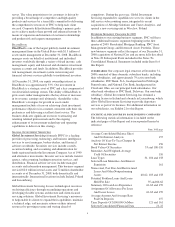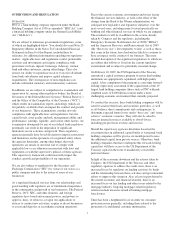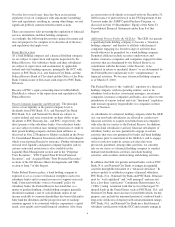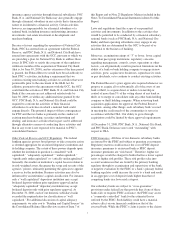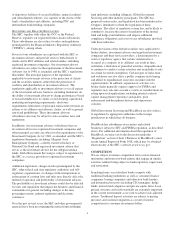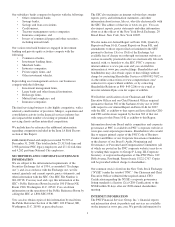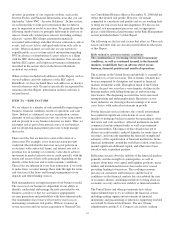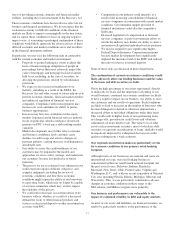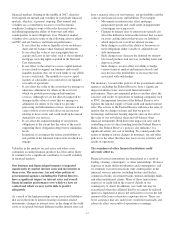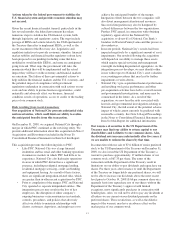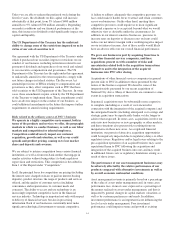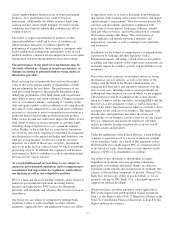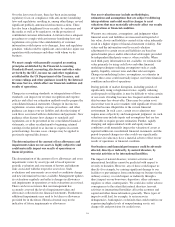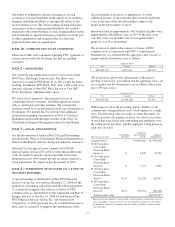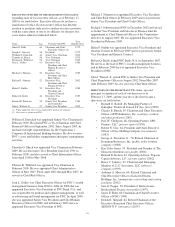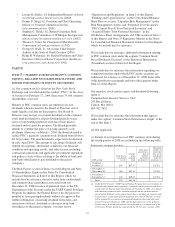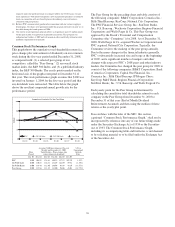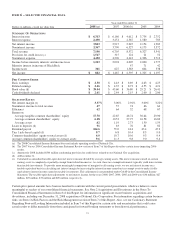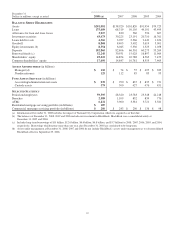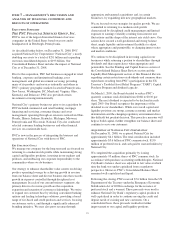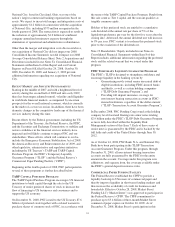PNC Bank 2008 Annual Report Download - page 18
Download and view the complete annual report
Please find page 18 of the 2008 PNC Bank annual report below. You can navigate through the pages in the report by either clicking on the pages listed below, or by using the keyword search tool below to find specific information within the annual report.
Unless we are able to redeem the preferred stock during the
first five years, the dividends on this capital will increase
substantially at that point, from 5% (almost $400 million
annually) to 9% (almost $700 million annually). Depending
on market conditions and our financial performance at the
time, this increase in dividends could significantly impact our
capital and liquidity.
The US Department of the Treasury has the unilateral
ability to change some of the restrictions imposed on us by
virtue of our sale of securities to it.
Our agreement with the US Department of the Treasury under
which it purchased our securities imposes restrictions on our
conduct of our business, including restrictions related to our
payment of dividends and repurchase of our stock and related
to our executive compensation and governance. The US
Department of the Treasury has the right under this agreement
to unilaterally amend it to the extent required to comply with
any future changes in federal statutes. The Recovery Act
amended provisions of EESA relating to compensation and
governance as they affect companies such as PNC that have
sold securities to the US Department of the Treasury. In some
cases, these amendments require action by the US Department
of the Treasury to implement them. These amendments could
have an adverse impact on the conduct of our business, as
could additional amendments in the future that impose further
requirements or amend existing requirements.
Risks related to the ordinary course of PNC’s business
We operate in a highly competitive environment, both in
terms of the products and services we offer, the geographic
markets in which we conduct business, as well as our labor
markets and competition for talented employees.
Competition could adversely impact our customer
acquisition, growth and retention, as well as our credit
spreads and product pricing, causing us to lose market
share and deposits and revenues.
We are subject to intense competition from various financial
institutions as well as from non-bank entities that engage in
similar activities without being subject to bank regulatory
supervision and restrictions. This competition is described in
Item 1 of this Report under “Competition.”
In all, the principal bases for competition are pricing (including
the interest rates charged on loans or paid on interest-bearing
deposits), product structure, the range of products and services
offered, and the quality of customer service (including
convenience and responsiveness to customer needs and
concerns). The ability to access and use technology is an
increasingly important competitive factor in the financial
services industry. Technology is important not only with respect
to delivery of financial services but also in processing
information. Each of our businesses consistently must make
significant technological investments to remain competitive.
A failure to address adequately the competitive pressures we
face could make it harder for us to attract and retain customers
across our businesses. On the other hand, meeting these
competitive pressures could require us to incur significant
additional expenses or to accept risk beyond what we would
otherwise view as desirable under the circumstances. In
addition, in our interest sensitive businesses, pressures to
increase rates on deposits or decrease rates on loans could
reduce our net interest margin with a resulting negative impact
on our net interest income. Any of these results would likely
have an adverse effect on our overall financial performance.
We grow our business in part by acquiring from time to
time other financial services companies, and these
acquisitions present us with a number of risks and
uncertainties related both to the acquisition transactions
themselves and to the integration of the acquired
businesses into PNC after closing.
Acquisitions of other financial services companies in general
present risks to PNC in addition to those presented by the
nature of the business acquired. We describe some of the
integration risks presented by our recent acquisition of
National City above. Many of these risks are common to some
extent in acquisition transactions.
In general, acquisitions may be substantially more expensive
to complete (including as a result of costs incurred in
connection with the integration of the acquired company) and
the anticipated benefits (including anticipated cost savings and
strategic gains) may be significantly harder or take longer to
achieve than expected. In some cases, acquisitions involve our
entry into new businesses or new geographic or other markets,
and these situations also present risks resulting from our
inexperience in these new areas. As a regulated financial
institution, our pursuit of attractive acquisition opportunities
could be negatively impacted due to regulatory delays or other
regulatory issues. Regulatory and/or legal issues relating to the
pre-acquisition operations of an acquired business may cause
reputational harm to PNC following the acquisition and
integration of the acquired business into ours and may result
in additional future costs or regulatory limitations arising as a
result of those issues.
The performance of our asset management businesses may
be adversely affected by the relative performance of our
products compared with alternative investments as well as
by overall economic and market conditions.
Asset management revenue is primarily based on a percentage
of the value of assets under management and, in some cases,
performance fees, in most cases expressed as a percentage of
the returns realized on assets under management, and thus is
impacted by general changes in capital markets valuations as
well as by customer preferences and needs. In addition,
investment performance is an important factor influencing the
level of assets under management. Poor investment
performance could impair revenue and growth as existing
14


